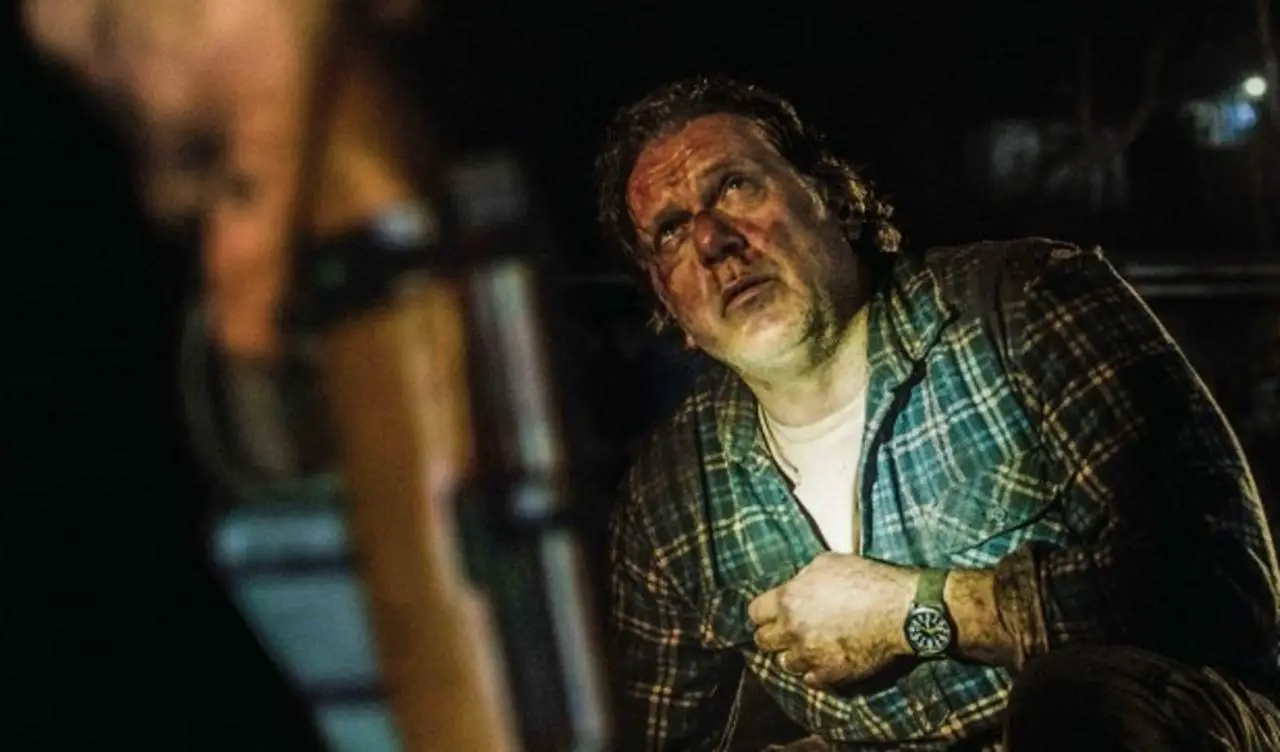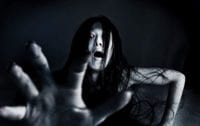The last film review I wrote was about possibly the goriest film I’ve ever seen, and although it was sunny and full of action, the blood and violence left no doubt that it was a horror film. Coming Home in The Dark is a complete contrast: it looks like a thriller, but it feels like a horror: bleak and harrowing to the bone.
Coming Home in The Dark opens with an everyday family, two parents and two sons, loving and bickering in equal measure, heading for a wild walk in very rural New Zealand. They stop for a rest only to find their picnic gate-crashed by two men, apparently drifters, rather than fellow hikers. All of a sudden it appears that the strangers take offence to the family, especially the father, and from there it turns into a day to remember for all the wrong reasons.
Parents Jill (Miriama McDowell) and Hoaggie (Erik Thomson) are on edge as soon as their unwelcome guests arrive. They look out for each other and their boys while trying to maintain some perilous dignity. They’re strong partners, and it’s good to see that no alpha male instinct comes to the surface as often does in films with families versus thugs. The teenage boys, Maika (Billy Paratene) and Jordan (Frankie Paratene), are interesting in how different they are to each other, whether falling out over music on the car journey or allying with different parents when under stress. They are played by brothers, who ad-libbed some of their lines together on set, but the bond with the parents appears just as real on screen as with each other.
Some have compared Coming Home in the Dark to Funny Games, as it is a well-known film about a family whose lives are changed by the introduction of two strangers. The two are very different in tone though (more on that shortly), and especially different with respect to the two strangers. In Coming Home, these are Mandrake (Daniel Gillies) and Tubs (Matthias Luafutu); the former’s civilised tongue belies his uncouth manner, and the latter talks little but follows his mate’s lead. In Haneke’s Funny Games, Peter and Paul were free-ranging sadists, playing with holidaymakers ostensibly to pass the time. Mandrake and Tubs need a focus, and once they find it, they refuse to let it lie.
Well, primarily I’m talking about Mandrake here. He has a slow swagger, doesn’t seem to care that nothing about him fits, and he is grimy like someone who treats everywhere as his home, instead of resigning himself to being homeless. It is he who pinpoints his grudge against Hoaggie, and slowly the others cease to matter, until just occasionally they do. As soon as his eyes are set on the man who could easily represent past wrongs, Coming Home’s tension is virtually unbreakable (at least until towards the end).

Let’s look again at the similarity with Funny Games and perhaps other home invasion stories like Moreau and Palu’s Ils. Those classics are itchy with claustrophobia, and in one’s own home (or even holiday home), this is especially uncomfortable. The Coming Home family are, at least initially, out in the great outdoors, but no less trapped—this time more by circumstances and forceful personalities rather than by four walls. As if to acknowledge that the open air does not necessarily bring freedom, Coming Home in the Dark gives up on all that and moves the confinement into a car for a major chunk of the film…and the tension is so desperate that the audience may well wonder if they’ll ever see the sky again.
This is a brutal film. For once, I’m not talking about extreme violence, but instead very base and sudden violence that cuts to the heart. It is not only that but also the stark awareness that there are moments in life that can change everything. At one point, Mandrake comments to Hoaggie that later on he might look back and wonder if this was one of those moments he could have done something; and this could be applied to several situations in the film, both in the main plot and in the past that the men find themselves looking back on.
Underneath the thriller, you see, there are a couple of pretty heavy themes. Like in Antebellum, the past is never dead. Whether it is a secret or something one has chosen to forget, it’s always there. As well as the nature of the past, the other key theme is about payback and responsibility: do past wrongs need to be paid for or is that just a grudge? Does it matter who pays, and who takes the payment? And the old chestnut, doing nothing: it helps no-one, sure, but is it actually as bad (or as responsible) as actively doing wrong?
Coming Home in the Dark was directed by James Ashcroft (film and TV actor until recent years) and written by him with Eli Kent, based on Owen Marshall’s short story. I would love to track down that story and find out if it had the same sense of a growing black cloud over it. There is indeed a huge amount to admire about the film: the way it kept me glued to my seat as I got to know this affectionate family, just knowing nothing could last; the way the camera pulled back to show the unique and beautiful landscapes and then slammed the door on the wonder of nature with a sudden brutal act. Matt Henley’s cinematography took me to a part of the world where I’ve never been and touched the faces of people in pain with equal respect. Oh, and I was quite lifted by the creative application of Grieg’s Peer Gynt.
Coming Home in the Dark screened at Fantasia International Film Festival last week, and will have its UK premiere later in August.


